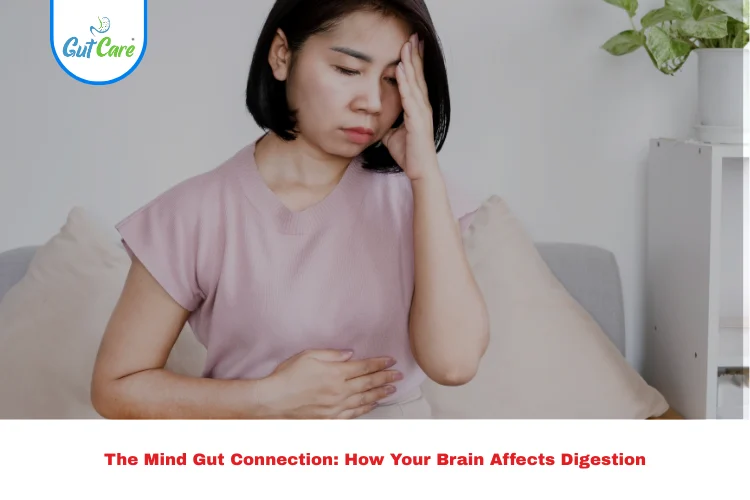The mind gut connection is one of the coolest findings in today’s medicine. Scientist have demonstrated that your brain is in constant communication with your stomach, and they both can affect the functioning of the other when it comes to digestion, mood, mental health, and overall well-being. The staff at Gutcare clinics in Bangalore are experts in this fact, and Dr. Yuvrajsingh Gehlot is one of their specialists in gastroenterology. As a result, Dr. Gehlot has always emphasized that gut health is the keystone for keeping your mind clear and your body balanced. Understanding the mind gut connection will help you understand earlier symptoms of digestive problems, be able to utilize natural remedies, and understand when you should consult a professional.
What is the Mind Gut Connection?
The link between mind and gut is the communication between the central nervous system (the brain) and the enteric nervous system (the gut). This exchange happens in both directions via the vagus nerve, neurotransmitters, and hormones, and this is why the gut is sometimes called the “second brain.”
Brain to Gut: Stress, anxiety, or depression can directly affect digestion, resulting in symptoms like bloating, cramps, and acid reflux.
Gut to Brain: Poor gut health can trigger mood swings, brain fog, or even conditions like anxiety and depression.
Signs That Your Mind Gut Connection is Imbalanced
Recognizing the signs early is essential for preventing long-term complications. Common symptoms include:
- Frequent tummy troubles – bloating, cramping, constipation, or diarrhea.
- Chronic stress and anxiety that make digestive issues worse.
- Food sensitivities such as being intolerant to dairy or gluten.
- Brain fog or fatigue relating to a poor gut microbiome.
- Mood disorders that improve or worsen depending on diet.
If these symptoms are persistent, visit a gastroenterology specialist like Dr. Yuvrajsingh Gehlot is highly recommended.
Why the Mind Gut Connection Matters
The mind gut connection is important as it affects:
Mental health: Serotonin, the “feel-good hormone,” is synthesized primarily in the intestine.
Immune system: A healthy gut leads to fewer gut disturbances, thus preventing chronic inflammation and increased immunity.
Sleep: Gut disturbances are a commonplace cause of disturbed sleep due to the change of the levels of gut microbiome.
Nutrient Absorption: Poor gut health can develop malabsorption in nutrients that leads to vitamin and mineral deficiency.
By improving gut health, you are addressing potential disturbances in digestion, nutrition, and in mental and emotional health.
Remedies to Improve the Mind Gut Connection
1. Diet and Nutrition
- Eat foods high in fiber (vegetables, fruits, whole grain).
- Eat fermented foods (such as yogurts, kefirs, kimchi) to promote healthy gut microbiota.
- Avoid processed, and sugar-laden foods (which affect the gut lining).
2. Stress Management
- Try yoga, meditation, or deep breathing exercises.
- Commit to a regular exercise routine to reduce your cortisol levels.
3. Sleep Well
- Disrupted sleep will affect gut bacteria and affect mental health.
- Be mindful of consistency with your sleep schedule (because of the balance).
4. Probiotics and Prebiotics
Note that supplements can help restore balanced microbiome – but be sure to see a health expert before taking.
5. Professional Help
When lifestyle changes/ remedies do not relieve issues, getting expert advice can help put you back on track. At Gutcare Clinics in Bangalore, Dr. Yuvrajsingh Gehlot will utilize advanced diagnostics and work with you to identify the roots of any gut issues to support healthy and personalized treatment options.
When to Consult a Medical Professional
For tolerable digestive issues such as bloating and constipation, adjustment to diet and lifestyle seem reasonable, but when symptoms persist, especially with serious symptoms like severe abdominal pain, ongoing diarrhea, unexplained weight loss, or recurrent bouts of anxiety, do not shrug it off. A proper referral to a specialist such as Dr. Yuvrajsingh Gehlot at Gutcare Clinics to rule out intermittent or underlying diagnosis like; IBS (Irritable Bowel Syndrome), GERD (Gastroesophageal Reflux Disease) or inflammatory bowel disease.
Conclusion
The mind gut connection shows that good gut health is directly related to mental clarity and emotional stability. If you eat well, manage your stress, and get good sleep, you should find that your gut and brain remain balanced. However, if symptoms continue, don’t hesitate to get expert help.
FAQs
1. What is the mind gut connection in simple language?
Mind gut connection is the continuous dialogue and feedback loop between your brain and gut that affect your digestion and emotions.
2. How do I improve mind gut connection?
By sustaining a healthy gut through a well-balanced diet, at an individual level, limiting stress, getting better quality sleep, and some probiotics to sustain the microbiome.
3. When should I see a specialist about gut health problems?
If you’re experiencing prolonged symptoms, for example, abdominal pain, chronic constipation, or ongoing anxiety/discomfort with digestion, you should consult a gastroenterology specialist, such as Dr. Yuvrajsingh Gehlot.
4. Is the mind gut connection involved in mental health?
Absolutely. Most of the serotonin is produced in the gut, and when your gut is out of balance, this can affect anxiety, depression, and mood shifts.
5. Do Gutcare Clinics in Bangalore treat mind gut connection issues?
Yes. Gutcare clinics in Bangalore offer state-of-the-art treatment, and expert guidance through conditions associated with the mind gut connection under Dr. Yuvrajsingh Gehlot.




